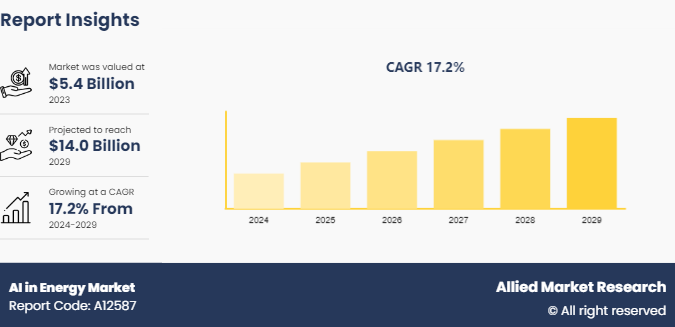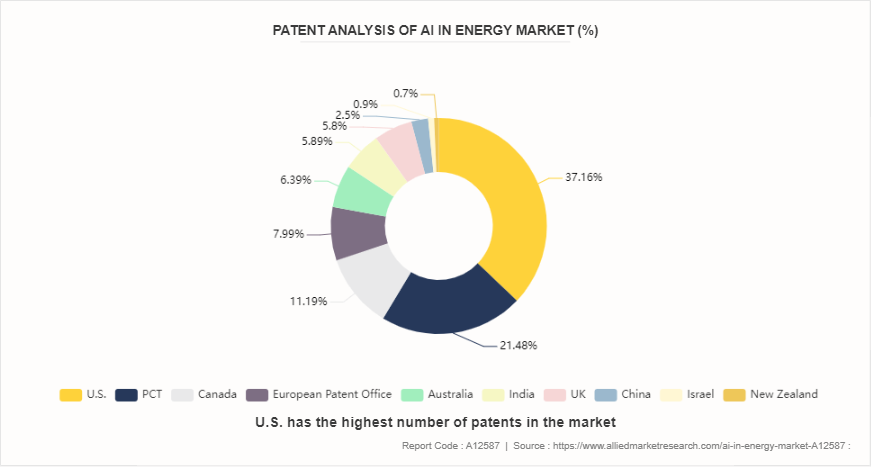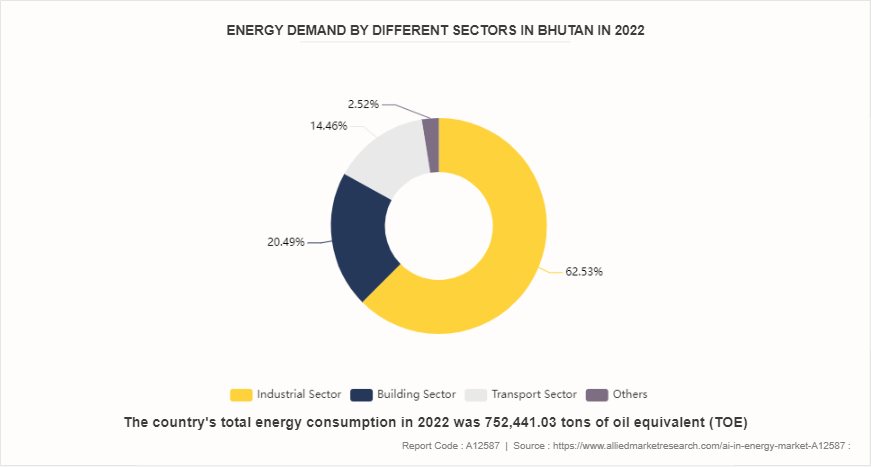AI In Energy Market Overview
The global AI in energy market was valued at USD 5.4 billion in 2023, and is projected to reach USD 14.0 billion by 2029, growing at a CAGR of 17.2% from 2024 to 2029. Integration of renewable energy and adoption of distributed energy resources (DERs) are driving AI in energy market growth. Advancements in predictive analytics and energy storage optimization further boost efficiency and grid stability.
Key Market Insights
- Rising integration of renewable energy sources into the grid with AI-driven predictive analytics.
- AI optimization of energy storage systems for efficient charging and discharging.
- Increasing focus on grid flexibility and virtual power plant models.
- Expansion of AI applications in demand forecasting and supply optimization.
- Surge in collaborations between energy companies and AI technology providers.
Market Size & Forecast
- 2029 Projected Market Size: USD 14.0 billion
- 2023 Market Size: USD 5.4 billion
- Compound Annual Growth Rate (CAGR) (2024-2029): 17.2%

Market Introduction and Definition
Artificial Intelligence (AI) is revolutionizing electricity technology by enhancing the efficiency of renewable power sources like wind, solar, and hydroelectric power. In wind energy, AI algorithms predict weather patterns and wind speeds to optimize turbine operations. For example, computer learning models can adjust the perspective of wind turbine blades in real time to maximize power capture. In photo voltaic power, AI systems forecast sunlight availability and manipulate the positioning of photo voltaic panels to ensure optimal exposure, thus improving the efficiency of photovoltaic cells. AI enhances the functionality and upkeep procedures in photovoltaic (PV) power stations by identifying, sorting, and forecasting abnormalities while planning scheduled maintenance events. In doing so, productivity levels are raised to achieve efficient energy delivery with minimal interruptions.
Artificial intelligence and machine learning solutions are being developed for launch vehicles, spacecraft operations, big data analytics, space robotics, and space traffic management. One of the primary advantages of integrating AI into the energy industry lies in the optimization of energy production and distribution. AI technologies, such as machine learning algorithms, enable the analysis of vast datasets related to energy production, consumption patterns, and environmental factors. This data-driven approach allows for more accurate prediction of energy demand, facilitating the efficient planning and operation of power plants. By optimizing production schedules and distribution networks, AI helps minimize energy wastage, leading to increased overall efficiency.
Predictive maintenance is another significant advantage offered by AI in the energy sector. Through the analysis of sensor data and performance metrics, AI algorithms may predict equipment failures before they occur. This proactive approach to maintenance helps prevent unexpected downtime, reduces repair costs, and prolongs the lifespan of critical infrastructure. By optimizing maintenance schedules based on actual equipment conditions, AI enhances operational efficiency and minimizes disruptions.
Key Takeaways
The AI in energy industry covers 20 countries. The research includes a segment analysis of each country in terms of value ($billion) for the projected period (2024-2029) .
The study integrated high-quality data, professional opinions and analysis, and critical independent perspectives. The research approach is intended to provide a balanced view of the global AI in energy market overview and to assist stakeholders in making educated decisions to achieve their growth objectives.
Over 3,700 product literature, annual reports, industry statements, and other comparable materials from major industry participants were reviewed to gain a better understanding of the AI in energy market size.
The AI in energy market share is highly fragmented, with several players including Atos SE, Siemens Energy, Schneider Electric, GE Vernova, Terex Corporation, Vestas, Iberdrola, S.A., JinkoSolar Holding Co., Ltd., AutoGrid Systems, Inc, Constellation. Also tracked key strategies such as acquisitions, product launches, mergers, and expansion of the players operating in the AI in energy market growth.
Market Segmentation
The artificial intelligence (AI) in energy market is segmented into component type, deployment type, application, end-use, and region. On the basis of component type, it is classified into solutions and services. By deployment type, the market is categorized into on-premise and cloud. On the basis of application, the market is fragmented into robotics, renewables management, demand forecasting, safety & security, infrastructure, and others. On the basis of end-use, it is divided into energy transmission, energy generation, energy distribution, and utilities. Region-wise, the market is studied across North America, Europe, Asia-Pacific, and LAMEA.
Key Market Dynamics
Integration of renewable energy is expected to boost the growth of AI in energy market during the forecast period. AI algorithms can process large datasets, along with historic climate patterns, energy production data, and real-time sensor data, to predict future energy generation from renewable sources. This predictive functionality is crucial for grid operators to plan and control energy resources efficiently. For instance, by forecasting periods of high solar or wind energy production, operators can prepare to keep extra energy or distribute it more effectively. Conversely, during anticipated low production periods, AI activate backup power sources or deploy demand response techniques to keep grid stability.
Energy storage systems, such as batteries, are critical for managing the variability of renewable energy. AI can optimize these systems by determining the most efficient times to charge and discharge energy based on real-time data and predictive analytics. For example, during a sunny day with high solar output, AI can ensure that batteries are charged to store the surplus energy. Later, during nighttime or cloudy periods, the stored energy can be released to meet demand. In July 2022, IBM Corporation made headlines with its acquisition of Databand, a prominent player in the realm of data observability software. This move underscores IBM's commitment to enhancing its software portfolio in data, AI, and automation. By integrating Databand's technology, IBM aims to empower businesses to maintain the integrity of their data and ensure it reaches the right people at the right time, thereby bolstering its capabilities in data observability.
The increase in adoption of distributed energy resources (DERs) is expected to provide lucrative opportunities in the AI in energy market forecast. The proliferation of distributed energy resources (DERs) such as rooftop solar panels, small wind turbines, and home battery systems adds another layer of complexity to grid management. AI can integrate these decentralized resources into the grid by coordinating their operation to match demand with supply. For example, AI systems can aggregate the output from numerous small-scale solar installations and treat them as a single virtual power plant. This coordination ensures that the aggregated energy can be dispatched reliably and predictably, aiding in grid stability, and reducing the reliance on large, centralized power plants. In January 2024, the International Energy Agency (IEA) released a report indicating that global renewable electricity generation capacity is rapidly expanding. This growth presents a significant opportunity to meet the goal set by governments at the recent COP28 climate change conference to triple global capacity by 2030. In 2023, the addition of renewable energy capacity to energy systems increased by 50%, totaling nearly 510 gigawatts (GW) . Solar photovoltaic (PV) technology dominated these additions, accounting for three-quarters of the global increase.
However, data privacy and security are expected to restrain the growth of AI in the energy market during the forecast period. Data privacy and security are paramount considerations due to the vast amount of sensitive data collected and analyzed by AI systems. As energy companies increasingly adopt AI technologies to optimize operations, improve efficiency, and enhance grid management, they must ensure that robust safeguards are in place to protect the privacy and security of both consumer and operational data. Smart meters provide granular insights into individual energy consumption patterns, which can be valuable for optimizing demand response programs and personalized energy services. However, this data also poses privacy risks if not adequately protected. Energy companies must implement strict privacy policies and encryption protocols to safeguard consumer data against unauthorized access or misuse. This includes anonymizing and aggregating data wherever possible to minimize the risk of re-identification.

What are the key projects driving the adoption of Artificial Intelligence (AI) in the energy sector?
In December 2024, the Green Powered Future Mission sets out to achieve full integration of 100% variable renewable energy (VRE) by 2030, focusing on three key pillars: ensuring accessible and dependable VRE, enhancing system flexibility and market structures, and leveraging data and digitalization for seamless system integration.
The Ebalance-Plus project (2020-2024) aims to increase the energy flexibility of distribution grids, predict available flexibility, increase grid resilience, and design new ancillary models to promote flexibility markets. It unlocks flexibility in distribution grids to support prosumers and operators
The Heat 4.0 project (2021-2022) created a digital platform for the district heating industry called HEATman. It integrates technologies and research to maximize economic and ecological effects by synergizing design, operation, and maintenance of district heating systems
The Flexible Energy Denmark (FED) project (2019-2023) focuses on digitalization and making energy consumption flexible. It developed principles for a data lake with AI tools and solutions for Living Labs to unlock flexibilities.
Which are the Top AI in Energy companies
The following are the leading companies in the market. These players have adopted various strategies to increase their market penetration and strengthen their position in the AI in energy industry.
- Atos SE
- Siemens Energy
- Schneider Electric
- GE Vernova
- Terex Corporation
- Vestas
- Iberdrola, S.A.
- JinkoSolar Holding Co., Ltd.
- AutoGrid Systems, Inc.
- Constellation
Industry Trends
As per the International Energy Agency (IEA) in 2022, renewable energy supply from solar, wind, hydro, geothermal and ocean rose by close to 8%, meaning that the share of these technologies in total global energy supply increased by close to 0.4% points, reaching 5.5%. Modern bioenergy's share in 2022 increased by 0.2% points, reaching 6.8%.
AI serves more than 50 different uses in the energy system, and the market for the technology in the sector could be worth up to $13 billion. One of the most common uses for AI by the energy sector has been to improve predictions of supply and demand. Developing a greater understanding of both when renewable power is available and when it is needed is crucial for next-generation power systems.
In December 2022, Oil and Gas Holding Co. (nogaholding) partnered with ADNOC's Abu Dhabi-based technology venture, AIQ, to enhance its upstream operations through the integration and implementation of digital solutions and artificial intelligence. This collaboration allows nogaholding to leverage AIQ's latest AI technologies to boost operational efficiency.
In January 2023, C3 AI, a software company specializing in AI applications, introduced the C3 Generative AI Product Suite, starting with the release of C3 Generative AI for Enterprise Search. This suite features advanced transformer models, designed to simplify integration for customers across various value chains. The implementation of C3 Generative AI is set to enhance transformation initiatives across multiple business functions and industries, including the oil and gas sector.
In 2022, the European Union witnessed a surge in the importation of energy-intensive products due to soaring domestic energy costs. This influx effectively translated into the indirect importation of electricity, with over 160 TWh—equivalent to 6% of Europe's electricity demand being imported. These products included chemicals, primary aluminum, crude steel, paper pulp, and cement, highlighting the interconnectedness of global energy consumption and industrial manufacturing.

Technology Trend Analysis
Thermal energy storage (TES) systems store thermal energy to be used later for heating or cooling applications and help to balance the fluctuating energy supply and demand. These systems have a considerable benefit in shifting the thermal peak load, leveling the thermal load, and reducing energy consumption, CO2 emissions, and operating costs while also increasing the overall energy system efficiency.
In January 2022, the Chinese government unveiled plans to construct 11 Concentrated Solar Power (CSP) projects, all featuring thermal energy storage, by 2024. These projects are set to be gigawatt-scale, integrating mixed renewable energy sources, and are slated for completion within two years. Leading the initiative will be state-owned Chinese firms, which will collaborate with other industry players in these large-scale ventures. Artificial intelligence has become popular for analyzing data from sensors monitoring the TES system to predict potential failures or maintenance needs.
Additionally, a new gravitational-based storage solution called Lift Energy Storage Technology (LEST) has been proposed, which utilizes lifts and empty apartments in tall buildings to store energy. Finally, a system combining the advantages of compressed air storage and pump storage is being developed, which minimizes the disadvantages of both systems and achieves high efficiency.
Additionally, a new gravitational-based storage solution called Lift Energy Storage Technology (LEST) has been proposed, which utilizes lifts and empty apartments in tall buildings to store energy. AI system combines the advantages of compressed air storage and pump storage is being developed, which minimizes the disadvantages of both systems and achieves high efficiency.
Historic Trends AI in the Energy Market
In the 1970s, early expert systems such as DENDRAL and MYCIN are developed, showcasing AI's potential in specialized tasks. The energy sector has begun to explore these technologies for optimizing complex processes, although practical applications are limited due to computational constraints.
In 1986, the Electric Power Research Institute (EPRI) in the U.S. began significant explorations into the application of artificial intelligence (AI) for power system operations. The integration of AI technologies within the energy sector, particularly in enhancing the efficiency and reliability of power systems.
In the 2000s, the integration of renewable energy sources (RES) such as wind and solar into the power grid presents new challenges. AI is used to address issues of variability and predictability in renewable energy production.
In 2005, the European Union began significant investments in smart grid technology, incorporating AI to enhance the efficiency and reliability of power systems that integrate renewable energy.
In 2021, AI technologies are deployed to optimize the integration of electric vehicles (EVs) into the grid, balancing supply, and demand more effectively.
Key Sources Referred
PubGenius Inc.
FDM Group
International Energy Agency (IEA)
U.S. Department of Energy
Argonne National Laboratory
Key Benefits For Stakeholders
This report provides a quantitative analysis of the market segments, current trends, estimations, and dynamics of the ai in energy market analysis from 2024 to 2029 to identify the prevailing ai in energy market opportunities.
The market research is offered along with information related to key drivers, restraints, and opportunities.
Porter's five forces analysis highlights the potency of buyers and suppliers to enable stakeholders make profit-oriented business decisions and strengthen their supplier-buyer network.
In-depth analysis of the ai in energy market segmentation assists to determine the prevailing market opportunities.
Major countries in each region are mapped according to their revenue contribution to the global market.
Market player positioning facilitates benchmarking and provides a clear understanding of the present position of the market players of ai for energy.
The report includes the analysis of the regional as well as global ai in energy market trends, key players, market segments, application areas, and market growth strategies.
AI in Energy Market Report Highlights
| Aspects | Details |
| Market Size By 2029 | USD 14.0 Billion |
| Growth Rate | CAGR of 17.2% |
| Forecast period | 2024 - 2029 |
| Report Pages | 300 |
| By Component Type |
|
| By Deployment Type |
|
| By Application |
|
| By End-Use |
|
| By Region |
|
| Key Market Players | JinkoSolar Holding Co., Ltd, GE Vernova, Terex Corporation, AutoGrid Systems, Inc., Schneider Electric, Siemens Energy, Vestas, Iberdrola, S.A., Constellation, Atos SE |
The global ai in energy market was valued at $5.4 billion in 2023, and is projected to reach $14.0 billion by 2029, growing at a CAGR of 17.2% from 2024 to 2029.
Key market players in the AI in energy market include Atos SE, Siemens Energy, Schneider Electric, GE Vernova, Terex Corporation, Vestas, Iberdrola, S.A., JinkoSolar Holding Co., Ltd., AutoGrid Systems, Inc, and Constellation.
Asia-Pacific is the largest region for the AI in energy market.
Safety & Security is the leading application of AI in energy market.
The increase in adoption of distributed energy resources (DERs) are the upcoming trends of AI in energy market.
Loading Table Of Content...



